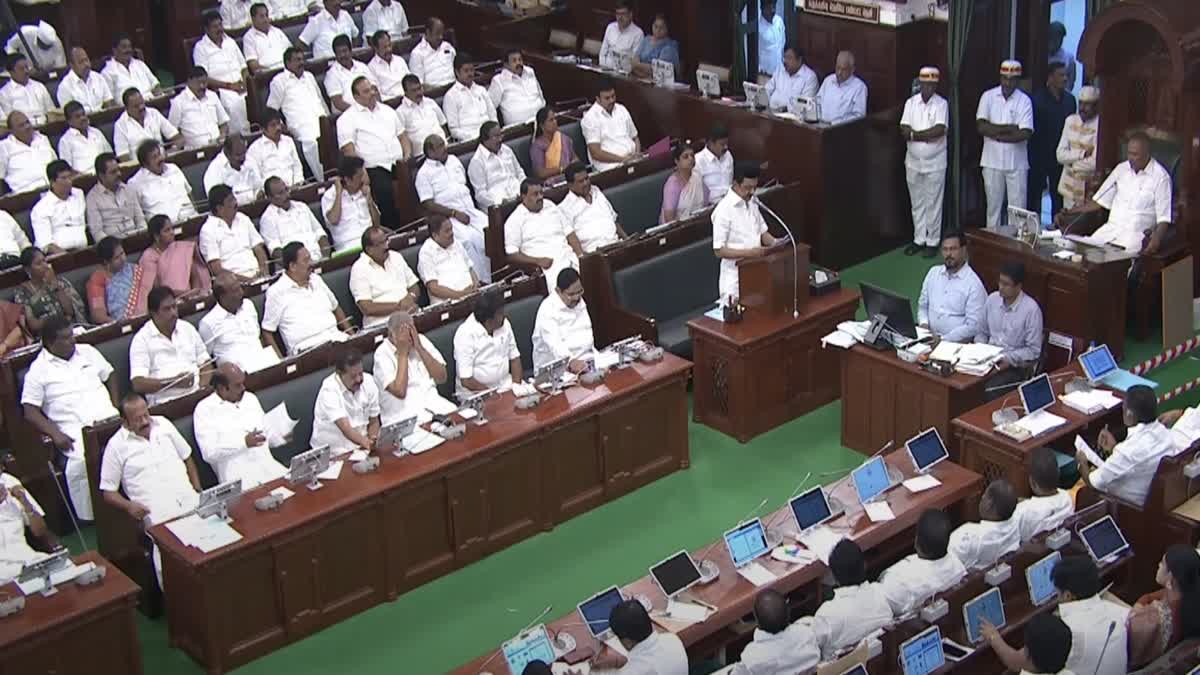Chennai (Tamil Nadu): Within a week of Governor RN Ravi withholding assent for months together to 10 Bills passed by the Tamil Nadu Assembly and returning the same, the House readopted them without any change either in nomenclature or in substance at a special session. Since the Raj Bhavan had withheld the stamp of approval instead of returning them for reconsideration for the same earlier, doubts remain as to whether he is bound to give his assent now.
Predictably, the opposition AIADMK and the BJP staged a walkout and the Bills were passed by a voice vote. The hurriedly called special session proved to be an occasion to launch a scathing criticism of Ravi and the BJP-led Union Government for creating troubles in opposition-ruled states through the office of the Governor. “In states not ruled by the BJP, troubles are created through the governors. Now, returning a few and keeping some after the Supreme Court's knuckle is a drama... Not giving assent to 12 Bills, including the 10, and some files is illegal, anti-people, and goes against the grain of conscience. Moreover, it is violative of the sovereignty of the House,” Chief Minister MK Stalin said, moving a resolution, seeking support to pass the Bills.
“Every day he invites some people and holds classes. There is nothing wrong with him taking classes, but what he teaches is utter falsehood. He participates in festivals but stokes controversies. Criticising the government's policies does not behove well for the office he is holding. He is unable to stomach the Dravidian ideology and the ideals of equality, social justice, rationalism, and self-respect entrenched in the minds of the Tamils. Further, he undermines Tamil culture and literature in public platforms. From his views, it becomes evident that he has problems not only with the Bills passed by the assembly but social justice as well. That is why he is placing hurdles in every possible manner,” Stalin said.
Stating that the governor refusing assent is an insult to the House and the people of Tamil Nadu, the Chief Minister however maintained that though the office of governor needs to be abolished, democracy requires that it be given due respect so long as it exists. Tamil Nadu government was forced to approach the apex court since taking up the matter with the President and the Prime Minister to rein in the governor failed to yield desired results, Stasin added. He also maintained that now the governor was bound to grant assent as per Article 200 of the Constitution.
All the 10 Bills relate to state-run universities, of which two were passed during the previous AIADMK government of Edappadi K Palaniswami (EPS) regime and most of them strip the Governor as the Chancellor of the varsities, vested with the power to appoint Vice Chancellors. “I withhold assent” was what the governor had mentioned while returning the Bills a day after Deepavali (November 13). This comes after the apex court came down hard on the governor.
Opinion is divided on whether the governor had to approve the Bills as claimed by the Chief Minister. “The Bills were not returned by the governor for reconsideration. He had merely informed assent had been withheld. When a Bill is not returned for reconsideration and is passed again it becomes a new Bill. As such, the governor has the option to once again refuse assent. But, it is a grey area and the DMK government would have to knock on the doors of the judiciary. The Governor has to act on the advice of the council of ministers, even for withholding a Bill,” says senior journalist K Venkataramanan. Explaining further, he said, “The constitutional provision for withholding does not accord discretion to the governor. A government, in the last leg of its tenure, gets a Bill passed and it is sent to the Raj Bhavan. But, a new government that assumes office later can recommend the governor to withhold approval.” Now, it remains to be seen what course Ravi would take.



